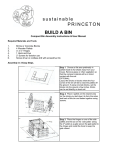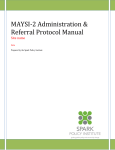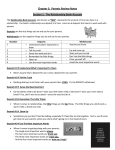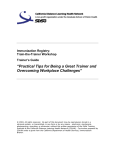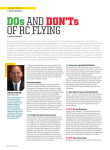Download Family - Crisis Center
Transcript
Working with Secondary Survivors F amily members, friends, and significant others of the survivor, or secondary survivors, will react to the trauma in similar ways as the survivor. They will also have the additional task of responding to the survivor in an empathetic manner. You may hear secondary survivors say they feel as if they are “walking on eggshells” and feel helpless in this situation. The same techniques outlined for working with survivors will also work for their family, friends, and significant others. The key is normalization and support. NORMALIZE • • • • Help the secondary survivor understand the nature of the crisis that rape survivors experience (i.e. explain rape trauma symptoms). Explain that they may be having similar reactions. Find out how they are dealing with the sexual assault survivor. Find out how they think thinks the survivor is dealing with the assault. Just as the survivor needed reassurance she/he is not going crazy, so will their family, friends, and significant others need such reassurance. It is important for these people to also seek support for themselves during this time. IDENTIFY SUPPORT SYSTEM • Discern what kind of support system exists for the person and the survivor. Are they the only support for the survivor? How can support system of the secondary survivor be bolstered? FOCUS • • Find out how recently the rape occurred. This might give a clue as to the nature of the crisis of the family, friend, or significant other and the survivor. Help the them clarify problems that may be happening as a result of the assault. Do they become sidetracked with pre-existing problems not affected by the assault? INFORMATION • • • • • • Explain confidentiality. You are unable to disclose any information you receive from the survivor. You can only talk with secondary survivors about their own concerns and generalized information about sexual assault. Provide pertinent medical, law enforcement, and legal information. Refer to other appropriate agencies as needed. Brainstorm ways in which they can help provide support for the survivor. Reaffirm that Rape Response services are available for them just as for the survivor. Educate the them about misconceptions and myths about rape. Volunteer Manual/Section 6/REV 10/18/13 1 Confusing Feelings It is normal for secondary survivors to feel angry, confused, and unsure of the best way to help their loved one. They may wonder if the survivor could have prevented the attack but not wish to ask such questions. They may find it difficult to listen to the "story," hoping that silence will make it go away. At other times, they may want to hear about everything that happened. Sometimes they will find their own feelings confusing. They may be embarrassed or want to keep the assault a secret for fear of what others may think. They may feel guilty or responsible, feeling they should have been able to prevent it. They may feel that if their advice had been followed, this would not have happened While these feelings are normal, it is very important to focus blame where it belongs: on the perpetrator. The perpetrator chose to commit this crime. Neither family, friends, significant others nor the survivor is to blame. ANGER • • • Explain that rape is an act of violence and hostility. Anger is a normal reaction, but too often is misdirected. Anger should be directed toward the rapist who committed the crime. Secondary survivors may feel rage toward the perpetrator, and consider actions that are out of character for them. Many survivors fear their loved ones will get hurt or arrested while trying to invoke revenge on their behalf. Threats to harm the rapist can cause the survivor more stress because s/he is concerned about the safety of their loved ones and legal ramifications. Channel secondary survivors’s thoughts toward what s/he can do for the survivor. They may feel that s/he should have prevented the rape. They can comfort the survivor by assuring the survivor of continued love and support, that the survivor is not to blame, and that the survivor is not less attractive. Providing Support Secondary survivors may want to make decisions for the survivor, hurry the healing process, or be overprotective. This is typically a sign that their need to be a good problem solver may be more important to them than the survivor’s needs. They can be most helpful to the survivor by listening, caring and believing. They should not make decisions for the survivor. Their support and information can be encouraging, but the decisions need to be made by the survivor. The survivor needs to feel he or she is "in control" of the situation. Family, Friends, and Significant Others Can Aid Healing By • • Believing the survivor. Letting the survivor know that she/he did the right things during the assault. Don't question or judge what she/he did to survive. Survival is evidence that she/he handled the assault correctly. Volunteer Manual/Section 6/REV 10/18/13 2 • • • • • • • • Reassuring the survivor that they still love her/him and that you know the assault was not her/his fault. Seeing and accepting the survivor’s hurt emotions. Recognizing the needs expressed by the survivor’s behavior. Recognizing the survivor’s sense of guilt and self-blame and help refocus that towards the perpetrator. Allowing the survivor to be in control of big and small decision making. Telling the survivor that you are there to listen and give support whenever she/he is ready to talk, but do not push. Respecting the survivor's decision to report or not report the assault to the police. There are tremendous personal sacrifices involved in prosecuting a sexual assailant and the survivor may not choose or feel able to make them. Getting help themselves to deal with their role in the survivor’s healing. Volunteer Manual/Section 6/REV 10/18/13 3 Responding to Disclosure of Sexual Assault S ometimes family, friends, or significant others just get the feeling that something is wrong. Perhaps it is because of how the person is behaving or things the person says or even doesn’t say. In times like those, there are things they can say and do which will create a safe environment for disclosure. Please keep in mind that it is vital not to ask leading questions, especially when working with children. Asking open-ended questions is a good way to avoid suggesting to the person that he or she was sexually assaulted. Questions like, “What happened to you that seems to cause the pain I see?” allows the person to respond freely. Behavioral changes that may occur following a sexual assault • • • • • • • • Fear of certain people or places Changes in eating and/or sleeping patterns Extreme moodiness or withdrawal Abrupt changes in conduct of any sort Work/School difficulties Frequent daydreaming – dissociation Problems relating to peers Changes in sexual behavior - promiscuity, problems with intimacy Creating a Safe Environment Be aware of the following needs of the survivor • Safety • Security • Understanding / Validation • Love and support • Trust • Use a private setting to talk to the person • Sit at or below the person’s level • Use informal body posture • Use casual eye contact - too much direct eye contact can increase feelings of shame • Control your emotions • Watch the person’s facial expressions, gestures, and posture • Give the person permission to feel emotions • Use the person’s words, especially sexual terms • Give the person permission to tell by saying things like Volunteer Manual/Section 6/REV 10/18/13 4 • • “I think you must have been hurt, and it wasn’t your fault. I want to understand what happened, so I can help you feel safe. Will you tell me what happened?” or “I won’t think you are bad and I won’t punish you.” Let the person know this has happened to others like them If the person chooses not to accept the opportunity to talk, then do not pressure them. Their needs must always be the priority. However, if the person is under 18 years of age and you suspect abuse you must follow procedures for reporting to officials regardless of whether the child confirms your suspicions or not. Responding to Disclosure Immediately respond by saying . . . • I believe you. • I am glad you told me. I know it was not your fault. • I am sorry it happened. • I will do my best to keep you safe. I BELIEVE YOU Follow up by inquiring • Do you feel safe from future harm? • Have you received medical attention? Volunteer Manual/Section 6/REV 10/18/13 5 A Note about Intimate Relationships I t is common for survivors to feel hesitant about resuming dating, socializing, and intimacy following a sexual assault. There is no need for them to force themselves into intimate social situations too quickly. Delaying this may allow them to gradually reintroduce themselves to safe, enjoyable, and healthy relationships. If the assailant is someone they know, they may feel their trust in that person has been destroyed as well as their trust in their own judgement about people, in general. Trust is widely acknowledged as a character trait, not a character defect. It is unfortunate that someone betrayed that trust. They will need to learn to trust their instincts and act upon them. This will take time. Feeling Safe Feeling safe and comfortable are important guidelines for any relationship, especially those in which there is sexual intimacy. After a sexual assault, a survivor may feel fearful and confused during sex or they may feel out of control, like they did during the assault. Healing will happen most quickly if they are careful to choose sexual activities that feel comfortable and gentle. They are the only one who can determine this. Flashbacks are a frequent side effect of sexual assault. Flashbacks are feelings, thoughts, or images that almost reconstruct the assault. Flashbacks can be triggered by sounds, smells, touch, or sights. These images may occur during sexual activity and can produce feelings of guilt and confusion. It may be difficult to explain their reactions to their partner. Sometimes they may feel the need to stop or change what they are doing when the flashback occurs. At other times, they may be able to concentrate on something else. Overall, they may find it is better to allow the memory to come and go rather than try to shut it out or pretend it is not there. Confusion A common fantasy during sex is about being swept off your feet. This type of fantasy can produce enjoyable feelings and does not mean that you want to be raped. In fantasies, the person doing the fantasizing is totally in control of the content and the starting and stopping of the action. The desire to be out of control in fantasy is not a desire to be raped in real life. Another confusing phenomenon can occur during a sexual assault. Fear, disgust, and pain are almost always present during the assault, but a victim may also experience arousal or even an orgasm. If this happened to them, they may feel this means they really wanted it and they may feel as if their body betrayed them. It is important to understand that an orgasm is a natural biological response, which can occur with physical pressure and even fear. The presence of arousal or an orgasm does not change the fact that what happened to them was a violent crime. Their sexual recovery starts with the understanding that sexual assault is a crime of violence. The rapist used sex to overcome and humiliate them, but the motivation was not sexual. Accepting this, they can then recognize their and their partner’s sexuality as a caring, giving relationship, different from the rape. Volunteer Manual/Section 6/REV 10/18/13 6 Test Your Knowledge 1. How might you help a secondary survivor deal with their anger? 2. What is the number one thing family, friends, and significant others can do to aid healing? (This is also something that should be said immediately following disclosure.) 3. What might you say to the intimate partner of a survivor about the occurrence of flashbacks? 5. Which Rape Response services can secondary survivors access? Volunteer Manual/Section 6/REV 10/18/13 7








